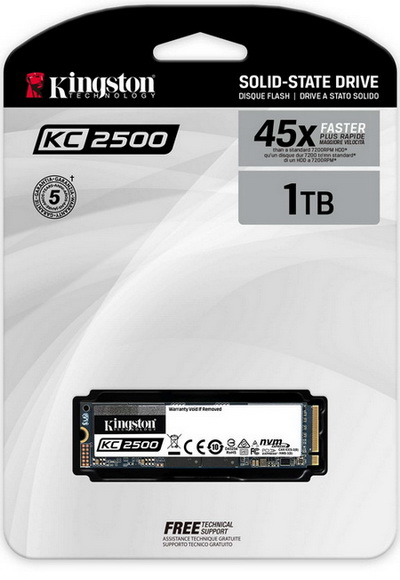INTRODUCTION

PCIe Gen 4.0 M.2 NVMe solid state drive models may currently hold the crown of the fastest consumer grade storage media but according to several manufacturers PCIe Gen 3.0 models still have plenty of room for improvement. On top of that add the fact that only the latest motherboard models by AMD and Intel support PCIe Gen 4.0 and there's not going to be a shortage of PCIe Gen 3.0 models in the market anytime soon. Last year Kingston released their top of the line KC2000 family of PCIe Gen 3.0 x4 M.2 NVMe SSDs (1TB model review here) and even though these weren't the fastest ones around they were still able to hit very high data transfer speeds of up to 3200MB/s in reads and 2200MB/s in writes. Almost exactly 1 year since then Kingston has just released their new family of PCIe Gen 3.0 x4 M.2 NVMe SSDs named the KC2500 and today I’ll be testing the 1TB variant (also among the first to do so).
Kingston Technology Company, Inc. is the world’s largest independent manufacturer of memory products. Kingston designs, manufactures and distributes memory products for desktops, laptops, servers, printers, and Flash memory products for PDAs, mobile phones, digital cameras, and MP3 players. Through its global network of subsidiaries and affiliates, Kingston has manufacturing facilities in California, Taiwan, China and sales representatives in the United States, Europe, Russia, Turkey, Ukraine, Australia, India, Taiwan, China, and Latin America.
The KC2000 line of PCIe v3.0 M.2 NVMe solid state drives was based on the Silicon Motion SM2262EN 8-channel NAND flash controller which Kingston had paired with Toshiba's BiCS4 96-layer 3D TLC NAND flash modules and so it didn't come as a surprise that they used the exact same configuration for the KC2500 line (the name does point to an upgrade of the KC2000 line rather than an entirely new one). Because of that the KC2500 line (currently available in 250/500/1000/2000GB models) still features the same technologies including Silicon Motion’s proprietary NANDXtend error-correcting code (ECC), datapath protection, end to end data protection with SRAM ECC, S.M.A.R.T, TRIM, NCQ, thermal-throttling, active garbage collection, DevSleep (device sleep), LDPC (Low Density Parity Check), SLC write acceleration (algorithms for optimal sustained performance), AES-XTS 256bit hardware encryption, TCG Opal 2.0 and IEEE-1667 (rendering the line fully compatible with Microsoft's eDrive and EU's GDPR). As expected even the endurance numbers are the same for both lines so aside the MTBF of 2.000.000 hours again we have 150TBW for the 250GB model, 300TBW for the 500GB model, 600TBW for the 1TB model and 1200TBW for the 2TB model. According to Kingston however the brand new KC2500 family can achieve data transfer speeds of up to 3500MB/s in reads and 2900MB/s in writes so where does the extra performace come from? Well if I’m correct leaving out some firmware tweaks (only normal for 1 year later) Kingston achieved this performance increase by using faster 1866MHz LPDDR3 SDRAM modules with the KC2500 line as opposed to the 1600MHz ones used in the KC2000 line. I will have to double check with Kingston about this (and if this isn't the case i'll update the review on Monday) but this seems to be the only visible difference between both lines*.
* After consulting with Kingston engineers it seems that aside firmware tweaks and different DRAM (which however is still clocked at 1600MHz since the controller doesn't support anything higher than that) the NAND of the KC2500 is also running at higher clock rates (650MT/s).

 O-Sense
O-Sense







.png)

